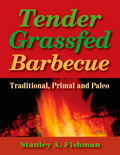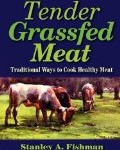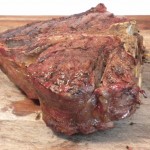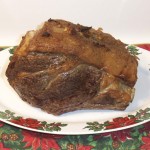Enjoy the Thanksgiving Feast Without Fear
By Stanley A. Fishman, author of Tender Grassfed Meat and Tender Grassfed Barbecue

Classic roast turkey with its delicious skin. Credit
When a holiday approached, our ancestors, all over the world, anticipated the feast with great joy, happiness, and anticipation. The feast would be prepared by skilled cooks, from the best traditional foods available, and would provide a happy time where everyone would enjoy the fun, happiness, satisfaction and joy of sharing a special great meal.
Yet in modern America, the approach of the holiday feasts is cluttered with a blizzard of cautionary articles, posts, and warnings that could ruin the joy of any meal. Avoid fat, avoid eating too much, avoid gaining weight, avoid eggs in the stuffing, avoid the skin on the turkey, avoid cooking the stuffing in the bird, avoid calories, avoid, avoid AVOID!
In other words, avoid the traditional joy of the feast and worry about what you eat, even on the holidays.
Most of the people who have lived on this earth would be puzzled by this kill-joy attitude.
I advocate enjoying the holiday feasts, and the traditional dishes that have been used to celebrate them.
The Claim that Animal Fat Is Bad for Us Has Been Debunked
Most of the fear of the feast is based on fear of fat. This fear is based on the debunked belief that animal fat is always bad for us. This is just not true, as documented in the book The Big Fat Surprise: Why Butter & Cheese Belong in a Healthy Diet, and many other credible sources, including articles in the New York Times and Time magazine.
My Thanksgiving Plans
I have seen ads for Thanksgiving which featured mounds of different kinds of steamed vegetables. I have seen vegetarian “roasts” made mostly of soy, in the shape of a turkey. I have read articles advocating roasting a turkey breast instead of a turkey, with the skin to be trimmed off and discarded before serving. None of these things are traditional, and none of them are for me.
Instead, we will have a traditional Thanksgiving feast, including:
- Roast whole pastured turkey, brined in my secret apple brine, and basted repeatedly with pastured butter while roasting
- Stuffing made from homemade cornbread; roasted chestnuts; onion and celery which have been cooked golden in plenty of pastured butter; as many whole eggs as it takes to moisten the stuffing; various herbs; and the minced heart and liver of the turkey; roasted inside the turkey in the traditional way
- Sweet potatoes, roasted whole until meltingly soft, and served with plenty of pastured butter
- Fresh cranberry sauce
- Sliced onions, cabbage, and apple, sautéed in plenty of melted bacon fat, with the bacon
- Gravy, made from lots of fatty turkey drippings, and homemade turkey broth, and the flavor-rich scrapings from the pan the turkey is roasted in
- And finally, a homemade pumpkin pie
And we will most definitely eat every last bit of the crisp, buttery, wonderful turkey skin.
Now, that is a feast to look forward to!
Disclaimer: Information found on the Tender Grassfed Meat site, including this article, is meant for educational and informational purposes only. Any statements or claims about the possible health benefits conferred by any foods or anything else have not been evaluated by the Food & Drug Administration and are not intended to diagnose, treat, cure, or prevent any disease. None of the content on the Tender Grassfed Meat site should be relied upon for any purpose, and nothing here is a substitute for a medical diagnosis or medical treatment.
This post is part o Fat Tuesday and Real Food Wednesday blog carnivals.
What Is Good to Eat? I Trust Traditional Cooking
By Stanley A. Fishman, author of Tender Grassfed Meat and Tender Grassfed Barbecue
If you read enough of the conclusions of studies reported in the news, you might decide that every single food you can eat is unhealthy in some way. It does not matter if the food is meat, poultry, seafood, fish, nuts, vegetables, or fruits, somewhere there is a study claiming it is unhealthy.
Obviously, if all the foods humanity has eaten, or can eat are unhealthy, we would not have survived as a species.
But how do we know what is good to eat? I found my answer through the research of Dr. Weston A. Price, who found that traditional peoples who ate their traditional diets were free from modern diseases, birth defects, and mental illness, even though many of the foods they ate were condemned by modern beliefs about food.
I base my diet on traditional food combinations, and the results have been fantastic.
It is better to look at all the foods eaten together, rather than just one food in isolation.
As a lawyer who specialized in legal research and analysis, I know a thing or two about researching an issue. What has always bothered me about most current food research is that they almost always seem to focus on a single food ingredient, or class of ingredients, and ignore the rest. An example would be studies that claim that red meat is unhealthy, yet ignore the other foods eaten, and many other factors.
But we do not eat foods in isolation. Usually, we eat many different kinds of food in a single day, and the substances in these foods interact with each other and our bodies. People do not normally eat just one food, or one class of food. To really know how food affects our health, I believe it is necessary to consider everything that is eaten, as it is the combination that effects our bodies.
Some studies have shown that the substances in one food will counteract the negative effects of the substances in another food, if the foods are eaten together. For example, studies have shown that the harmful glycemic effects of potatoes are greatly reduced or avoided if fat is eaten at the same time.
There is little current research on this, but Dr. Price looked at everything eaten by the peoples he studied, and the effect it had.
So I use as my guide the food traditions of many healthy peoples, making sure to use many of the same ingredients together that they did. For example:
- Nearly all cultures that ate potatoes never ate them without plenty of animal fat.
- The Chinese combined ginger, green onions, and garlic together in a huge number of dishes.
- Our ancestors never ate red meat without fat, usually animal fat, and usually plenty of it.
There are countless other examples, preserved in the traditional cooking and food traditions of nearly every nation, and I believe I have received great benefit by combining food according to these traditions.
Disclaimer: Information found on the Tender Grassfed Meat site, including this article, is meant for educational and informational purposes only. Any statements or claims about the possible health benefits conferred by any foods or anything else have not been evaluated by the Food & Drug Administration and are not intended to diagnose, treat, cure, or prevent any disease. None of the content on the Tender Grassfed Meat site should be relied upon for any purpose, and nothing here is a substitute for a medical diagnosis or medical treatment.
This post is part of Fat Tuesday and Real Food Wednesday blog carnivals.
In Defense of the Mighty Onion
By Stanley A. Fishman, author of Tender Grassfed Meat and Tender Grassfed Barbecue
Usually I write about meat. But today I am going to rise up in defense of one of our most important vegetables, the mighty onion.
A recent article on the Internet claimed that onions should not be eaten, claiming that onions have little nutritional value.
The overwhelming majority of our ancestors valued onions as one of their most important foods, using them for all kinds of culinary and healing purposes. I side with our ancestors on this one.
Onions Are Nutritious
The claim that onions are not nutritious is apparently based on the content of detectable vitamins and minerals. There are two problems with this claim.
The first problem is that researchers are constantly discovering new nutrients and substances in plants. Many of the nutrients we recognize today were unknown twenty years ago, or even five years ago. The discovery process continues.
Second, onions contain unique substances whose effect has not been fully researched. Some research has shown that onions have anti-bacterial and anti-inflammatory properties. These substances may have additional beneficial effects. Our ancestors certainly thought so.
Onions Are Traditional Food
If you research the world’s cuisines, as I have done for many years, you will find that onions may be the most used and most popular vegetable in history.
Onions were a vital part of the cooking of the ancient Egyptians, ancient Romans, ancient Greeks, ancient Chinese, ancient Celts, and just about every other significant ancient people we know of. Most of these peoples believed that onions were vital for their health and well being. Onions were used in marinades, stews, stir-fries, roasts, braises, and soups, and most meat dishes contained their share of onions.
Onions were also used for the following purposes:
- Issued as rations to soldiers, to make them strong, and keep them healthy
- As a medicine against a whole variety of ailments, especially colds and the flu
- To improve the taste of organ meats
- To tenderize meat, often being juiced for his purpose
- To purify and preserve food
Onions Are Widely Used By Traditional Cooks
Every modern cuisine I have studied, from Europe to Asia, to Africa, to South America, the Caribbean, and just about everywhere else, makes extensive use of onions in their traditional cuisines. Onions are widely used in meat dishes, vegetable dishes, soups, broths, curries—wherever you have traditional cooking, onions appear.
Onions Make Grassfed Meat Taste Better
I have found onions, whether yellow, red, or green, to be invaluable for tenderizing and flavoring grassfed meat. Nearly all of my stews, pot roasts, meatloaves, stir-fries, and most of my roasts contain onions in one form or another. My favorite vegetable to eat with grassfed meat is onions fried in plenty of butter, which I love.
I could go on and on about onions, but this will do for now.
I love onions!
This post is part of Fat Tuesday and Real Food Wednesday blog carnivals.


 Photos of recipes from the new book Tender Grassfed Barbecue
Photos of recipes from the new book Tender Grassfed Barbecue
 Photos of recipes from the cookbook Tender Grassfed Meat
Photos of recipes from the cookbook Tender Grassfed Meat

